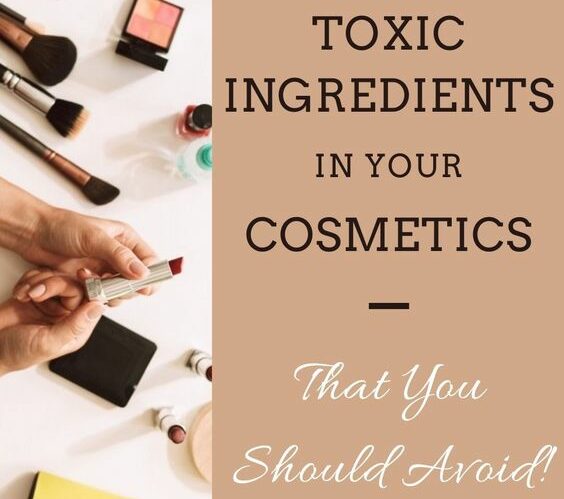
List Toxic Cosmetic Ingredients
The Importance of Choosing Safe Cosmetics: Avoid Harmful Ingredients
In recent years, the demand for eco-friendly cosmetics, vegan beauty products, and cruelty-free makeup has risen significantly. Consumers are increasingly seeking clean skincare brands and natural ingredients in cosmetics that promote better health for both the skin and the environment. It is crucial to be aware of harmful chemicals often found in personal care products, as they can contribute to various health and environmental issues. Let’s examine some of these dangerous substances, why they should be avoided, and how consumers can make more informed, ethical choices when it comes to their beauty routines.
List Toxic Cosmetic Ingredients to Avoid in Your Cosmetics
1. Aluminum Chloride
Aluminum Chloride is commonly found in antiperspirants and works by blocking sweat glands. However, it poses serious health risks, including skin irritation and possible long-term exposure concerns. Additionally, it has detrimental effects on aquatic organisms and persists in the environment. As a result, it is a substance best avoided in clean beauty products. Eco-friendly cosmetics and sustainable skincare solutions should avoid such ingredients.
2. Aminophenols (e.g., M-Aminophenol, O-Aminophenol)
Aminophenols are used in permanent hair dyes and bleaching products, but they can cause significant scalp and skin irritation. Therefore, when choosing vegan and cruelty-free brands, it’s essential to ensure these chemicals are excluded. The focus should be on plant-based beauty brands that use safe and natural alternatives to these harsh substances.
3. Artificial Colours (e.g., Azo Dyes)
Artificial colours, made from petroleum products, are common in makeup and personal care items. These colors often contain heavy metals like lead and arsenic, which are toxic. Natural makeup brands, on the other hand, utilize safe, plant-derived pigments. Therefore, opting for vegan makeup brands or cruelty-free cosmetics ensures a safer choice for both your skin and the environment.
4. Artificial Fragrances
Artificial fragrances, frequently created using petroleum-based chemicals, can irritate the skin and disrupt hormonal balance. Furthermore, many of these chemicals appear on hazardous materials lists, such as those from the U.S. Environmental Protection Agency (EPA). For fragrance, consumers are increasingly turning to vegan fragrance brands and non-toxic makeup options, which rely on natural, safe alternatives.
5. Bronopol
Bronopol, developed as a pesticide, is used as a preservative in cosmetics. It carries the risk of contamination with formaldehyde, a known carcinogen. Clean beauty brands and ethical beauty practices prioritize the use of safer preservatives, avoiding harmful substances like bronopol.
6. Butylated Hydroxyanisole (BHA)
BHA is used as an antioxidant in cosmetics, preventing them from spoiling. However, it is classified as a carcinogen by the International Agency for Research on Cancer (IARC). Sustainable beauty products and organic skincare products often avoid BHA in favor of more skin-friendly, non-toxic alternatives.
The Environmental Impact of Toxic Cosmetics
Many harmful chemicals the List Toxic Cosmetic Ingredients, such as phthalates and nonylphenol ethoxylates, break down in the environment and have extreme toxicity to aquatic life. As a result, these chemicals accumulate in ecosystems, causing long-term environmental damage. For example, nonylphenol ethoxylates are surfactants used in household products and some personal care items, but they persist in the environment, harming fish and other aquatic organisms.
When choosing skincare and makeup, it is important to consider the environmental impact of the products you purchase. Eco-conscious beauty packaging and cruelty-free beauty products contribute to less pollution and a more sustainable future. Eco-friendly packaging options, such as biodegradable containers or recyclable materials, are important aspects of a product’s overall sustainability.
Choose Products That Prioritize Your Health and the Planet
Sustainable skincare solutions and plant-based beauty brands are more than just trends; they represent a shift toward healthier, more ethical beauty practices. Vegan beauty for all is not only about avoiding animal testing but also about embracing a lifestyle that supports cruelty-free and non-toxic beauty products.
Moreover, high-performance skincare and radiant skin solutions that use natural ingredients in cosmetic scan provide effective results without the harmful effects associated with toxic chemicals. The market now offers minimalist beauty brands that focus on simple, effective formulations. These products contain no more than what is needed to nourish the skin and enhance beauty, eliminating harmful fillers or unnecessary chemicals.
Additionally, beauty brands that use organic skincare products and botanical skincare ingredients prioritize consumers’ health by avoiding controversial substances like formaldehyde and petrolatum. These brands offer products that are kind to the skin and more environmentally friendly.
Conclusion: Make Ethical Beauty Choices
To sum up, avoiding this List Toxic Cosmetic Ingredients and harmful chemicals in your beauty routine is crucial for both personal health and environmental protection. By choosing eco-friendly cosmetics, vegan beauty products, and cruelty-free makeup, you can protect yourself from the risks associated with harmful ingredients. Furthermore, supporting ethical beauty brands and sustainable beauty products ensures that your choices contribute to a cleaner, healthier world.
As consumers, we have the power to demand better products—non-toxic makeup brands, organic skincare products, and vegan hair care brands that prioritize inclusive shade ranges and ethical beauty practices. Embrace natural makeup brands that celebrate diversity and offer multi-use beauty products for convenience and versatility, all while keeping your beauty routine safe and sustainable.